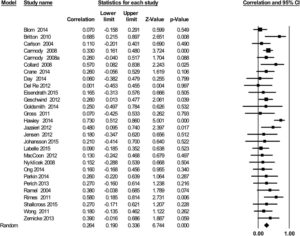Add Home Practice to Mindfulness Training for Maximum Benefit
By John M. de Castro, Ph.D.
“This is the clearest evidence we have that mindfulness-home practice can make a difference. This is a big source of debate because there are many components at play in a MBSR or MBCT course.“ – Christine Parsons
Mindfulness practices have been demonstrated to produce significant benefits for the practitioners’ health and well-being. Mindfulness-Based Stress Reduction (MBSR) and Mindfulness-Based Cognitive Therapy (MBCT) are specified practices that have proven track records over many years of effectiveness. They are both complex containing discussions, meditation, body scans, and yoga practices. Each is an 8-week program with participants only meeting for instruction once a week. They both rely on the participants practicing the techniques at home daily. There is, however, very little information regarding compliance with the home practice, to what extent do the participants fully comply with the instructions to practice at home, and what effects that may have on the effectiveness of the programs.
In today’s Research News article “Home practice in Mindfulness-Based Cognitive Therapy and Mindfulness-Based Stress Reduction: A systematic review and meta-analysis of participants’ mindfulness practice and its association with outcomes.” See summary below or view the full text of the study at: https://www.ncbi.nlm.nih.gov/pmc/articles/PMC5501725/, Parsons and colleagues review, summarize, and perform a meta-analysis of adherence to home practice requirements during 8 weeks of mindfulness training. They found 49 research articles employing Mindfulness-Based Stress Reduction (MBSR) or Mindfulness-Based Cognitive Therapy (MBCT) which required home practice.
They found that the studies reported that participants performed about 64% of the required home practice. That translated into an average of 29 minutes per day of the required 45 minutes. This level of compliance was found to be true regardless of whether clinical or non-clinical samples were used, or whether the primary outcomes were psychological or physical, or between MBSR or MBCT programs. They also found that there was a small, albeit significant, relationship between the amount of home practice and the magnitude of the benefits from the treatment, such that the greater the amount of home practice, the greater the benefit.
Hence, the published research literature suggests that participants in both MBSR and MBCT programs perform on average about 2/3rds of the required home practice and that the better the compliance with the home practice requirement the better the outcomes. This is actually surprising good levels of compliance. Unfortunately, most of the studies used self-reports of home practice and the participants may have felt compelled to report better compliance than what they actually did. Nevertheless, the research suggests that home practice is a beneficial component of the practices. It is possible that this is true because it brings the practice into the everyday environment of the participants, away from the artificiality of the clinic. This may help to more readily transfer what is learned from the clinic to the real world and thereby heighten the impact of the practices.
So, add home practice to mindfulness training for maximum benefit.
“home practice helps generate meaningful change in dispositional mindfulness, which is purportedly a key mechanism of action in mindfulness-based interventions.” – Dawn Epstein
CMCS – Center for Mindfulness and Contemplative Studies
This and other Contemplative Studies posts are also available on Google+ https://plus.google.com/106784388191201299496/posts and on Twitter @MindfulResearch
Study Summary
Parsons, C. E., Crane, C., Parsons, L. J., Fjorback, L. O., & Kuyken, W. (2017). Home practice in Mindfulness-Based Cognitive Therapy and Mindfulness-Based Stress Reduction: A systematic review and meta-analysis of participants’ mindfulness practice and its association with outcomes. Behaviour Research and Therapy, 95, 29–41. http://doi.org/10.1016/j.brat.2017.05.004
Abstract
Mindfulness-Based Cognitive Therapy (MBCT) and Mindfulness-Based Stress Reduction (MBSR) emphasize the importance of mindfulness practice at home as an integral part of the program. However, the extent to which participants complete their assigned practice is not yet clear, nor is it clear whether this practice is associated with positive outcomes.
For this systematic review and meta-analysis, searches were performed using Scopus and PubMed for studies published through to the end of 2015, reporting on formal home practice of mindfulness by MBSR or MBCT participants.
Across 43 studies (N = 1427), the pooled estimate for participants’ home practice was 64% of the assigned amount, equating to about 30 minutes per day, six days per week [95% CI 60–69%]. There was substantial heterogeneity associated with this estimate. Across 28 studies (N = 898), there was a small but significant association between participants’ self-reported home practice and intervention outcomes (r = 0·26, 95% CI 0·19,–0·34).
MBSR and MBCT participants report completing substantial formal mindfulness practice at home over the eight-week intervention, albeit less than assigned amounts. There is a small but significant association between the extent of formal practice and positive intervention outcomes for a wide range of participants.
